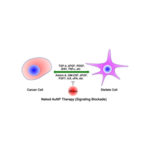 Gold nanoparticles could be an important part of developing a treatment for pancreatic cancer, according to new research published yesterday in the journal ACS Nano.
Gold nanoparticles could be an important part of developing a treatment for pancreatic cancer, according to new research published yesterday in the journal ACS Nano.
Previous work demonstrated that gold nanoparticles can be an effective vehicle to carry chemotherapy drugs into tumors. They can also act as a target to enhance the impact of radiation on tumors. Lead researcher Priyabrata Mukherjee has shown that the nanoparticles can limit tumor growth and curb metastasis in a model of ovarian cancer in mice.
New research by Mukherjee’s team shows that the nanoparticles can effectively disrupt tumor formation in mouse models of pancreatic cancer. The work highlighted details about cellular communication around pancreatic tumors. Gold nanoparticles interrupt this communication and reduce the cellular growth and migration that normally occurs near the tumors.
The microenvironment around a tumor comes from “bidirectional crosstalk” between pancreatic cancer cells and pancreatic stellate cells. The researchers observed that gold nanoparticles can impair protein secretion in both cell types, reducing activation of pancreatic stellate cells.
The size of the gold nanoparticles used in this study were not toxic to healthy cells.
The National Cancer Institute estimates that 53,000 new cases of pancreatic cancer will be diagnosed in the US this year and over 40,000 of those patients will die.
